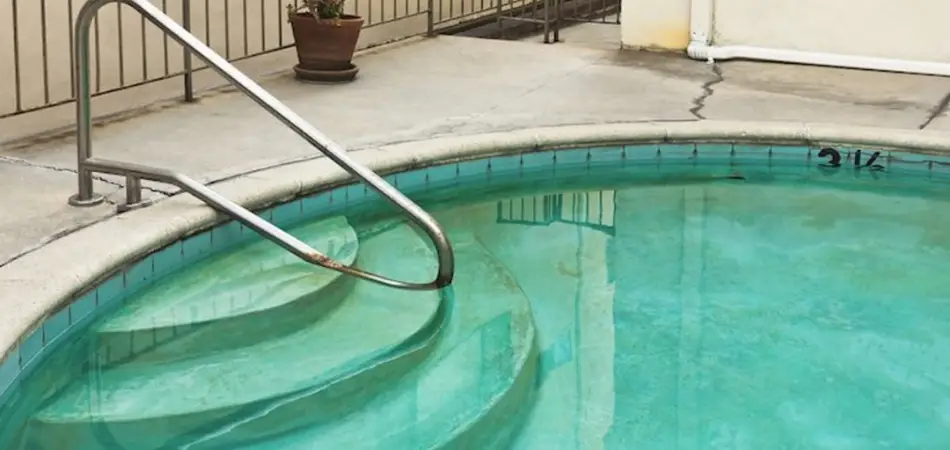If you are installing a pool, you may be wondering about the material used for the decks, stairs, ladders, and diving boards. One option to consider is aluminum. And the question is, does aluminum rust in pool water?
No, aluminum can’t rust but can corrode. It will react with the chlorine in the water and form aluminum chloride, which is the chalky white oxide film you see on the outer surface. The chalky white oxide film can be cleaned off by washing the metal with any household cleaner or scouring it with steel wool.
The way rusts work is by oxidizing when the material is exposed to water and air. Aluminum simply will not rust in this manner because it forms an outer coating of aluminum oxide, which is impervious and cannot react further with humidity or oxygen.
However, uncoated aluminum may corrode quickly when used in a chlorine pool environment. This post will reveal all you need to know about the right aluminum to use and how to prevent corrosion from taking place.
Contents
- Why Does Aluminum Corrode In Pool Water?
- How Long Does An Aluminum Above Ground Pool Last?
- Will A Pool With Less Chlorine Still Corrode An Aluminum?
- Can You Protect Aluminum From Corrosion?
- How Do I Know If My Pool Is Aluminum?
- What Material Is Best For Above Ground Pool?
- Is There A Metal That Does Not Rust?
Why Does Aluminum Corrode In Pool Water?
Aluminum corrodes in pool water as a result of the presence of chlorine. Chlorine is one of the major chemicals used to treat pool waters to make it healthy for bathing and swimming in it. Unfortunately, chlorine is not good for aluminum and a reaction between aluminum and chlorine will result in a reaction that causes aluminum to deteriorate faster than normal. Aluminum can survive and so well around pool areas, but not in the pool itself.
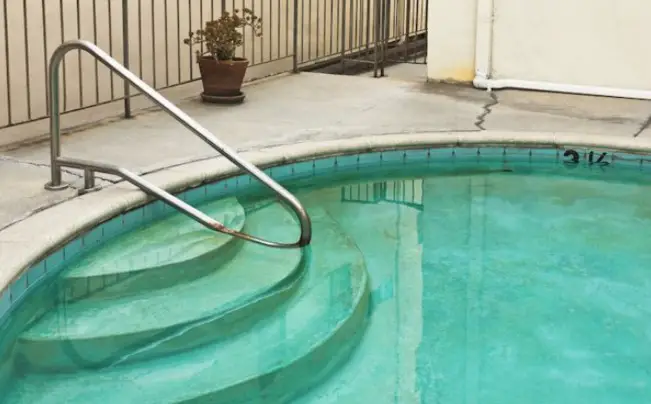
Although the reaction between aluminum and the pool water may not be obvious at first, the corrosion soon becomes untreatable if ignored for a long time. Aluminum alloys or materials are poorly suited for submergence in pool water, and the corrosion potential of this metal will be challenged if it stays in chlorinated water for long.
How Long Does An Aluminum Above Ground Pool Last?
The lifespan of an aluminum above ground pool can last as short as seven years and as long as fifteen years. It depends on two major factors, how much chlorine is present in the pool and how much water can get splashed on the aluminum from the pool.
However, an aluminum that is set above ground pool will still last longer than one submerged in the pool itself. This is because it will be exposed to less chlorine and moisture when compared to that present in the pool itself.
Will A Pool With Less Chlorine Still Corrode An Aluminum?
Yes, a pool with less chlorine will corrode aluminum. Pools are more chlorinated than each other and an aluminum that is exposed to less chlorine will do better than aluminum exposed to a higher quantity of chlorine. Also, apart from chlorine. Water or moisture itself is the main cause of corrosion.
Corrosion occurs as a result of oxidation that happens when moisture in air reacts with oxygen present in air. More moisture around will lead to a faster corrosion and water is mainly moisture.
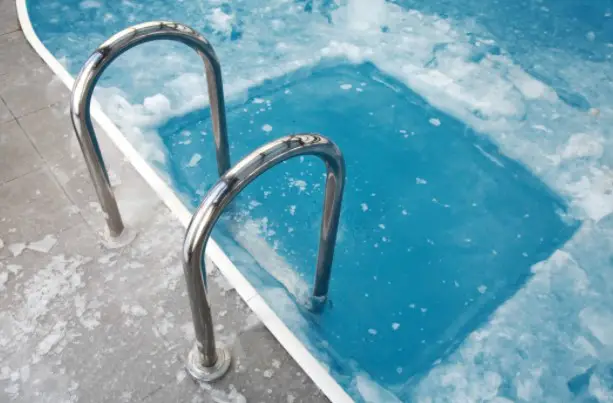
The only difference is that this oxidation will not cause a rusty effect. While a metal will flake and reveal a red or yellowish brown color, aluminum instead is protected by this corrosion except that in this case, the protection doesn’t have a good or presentable outward appearance.
Moisture is not a good ally for metals and to keep your aluminum safe and prolong its lifespan, you need to keep it clean and dry at all times. And aluminum that is kept around a pool can be tough when it comes to being kept dry and clean.
Can You Protect Aluminum From Corrosion?
Yes, you can protect aluminum from corrosion. Corrosion can pose a challenge to aluminum. To prevent aluminum from corroding, store aluminum in a dry place where moisture is unable to access it. This is because moisture will cause any metal to corrode once it is in contact with oxygen.
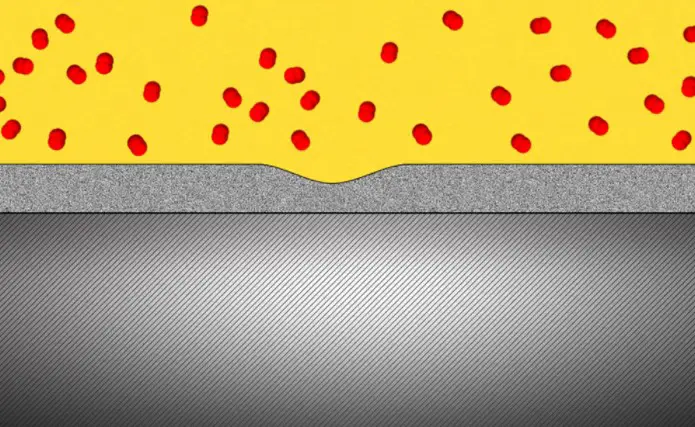
Also, application of a thin layer of protective clear coat to your aluminum material can help to prevent corrosion.Choosing an aluminum alloy that is resistant to corrosion is a great way to prevent aluminum from corroding too.
You should also also take into consideration the grade or series of aluminum you are making use of. Some grades of aluminum such as the 5052 and 3003, can resist corrosion more than the others. Also, some series of alloys offer good corrosion resistance.
How Do I Know If My Pool Is Aluminum?
Pool sides made of aluminum usually cost more than pool sides made for other metals but aluminum has a shorter lifespan in pool water when compared to other metals.
If you want to know whether your poolside is made of aluminum, try getting a magnet and sticking it to the side of the pool. If the magnet sticks, then it means the poolside is made of steel. But if the magnet does not stick, then it can imply that the poolside is made of aluminum.
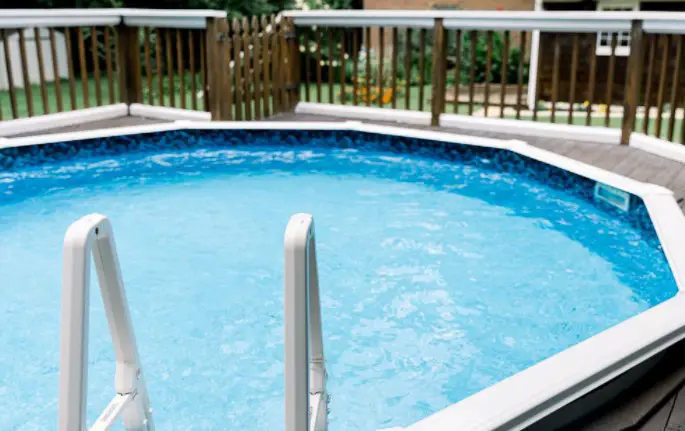
Also, aluminum materials give off a shinier surface when compared to steel. Another way to go about this is to consult a pool professional. Oftentimes, they can tell what a poolside is made of.
What Material Is Best For Above Ground Pool?
The best material for an above ground pool is steel material. A steel pool is by far the strongest. Although it often is not considered an option due to its affinity for rust, modern steel materials have a hot-dipped galvanized coat that resists rust. These coats are often accompanied by vinyl coatings
Aluminum materials are however considered better options for pools because of their ability to handle inclement weather.
Nevertheless, a steel pool has a longer lifespan than a pool made of aluminum materials.
Is There A Metal That Does Not Rust?
Yes, the metals that do not rust are known as silver, gold, and platinum. They are called precious metals, this is because they do not contain iron and therefore can not rust. Silver however can tarnish and is more affordable when compared to Gold and Platinum. Gold and Platinum are highly unreactive and do not tarnish.

